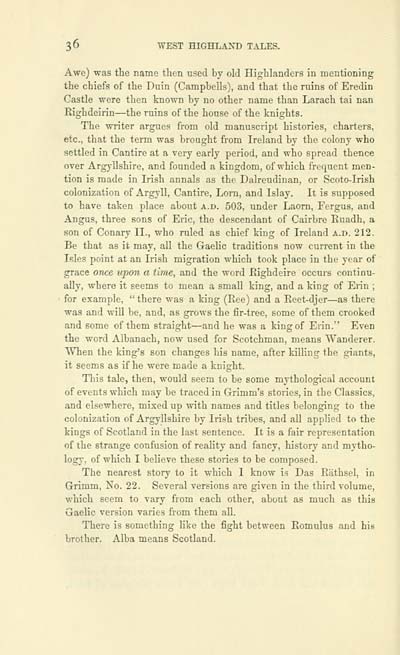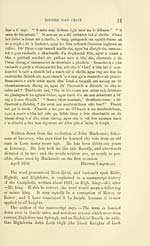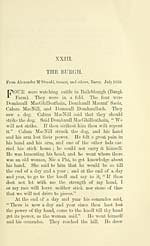Download files
Complete book:
Individual page:
Thumbnail gallery: Grid view | List view

36 WEST HIGHIiAXD TALES.
Awe) was the name then used by old Higlilandcrs in mentioning
the chiefs of the Duin (Campbells), and that the ruins of Eredin
Castle were then known by no other name than Larach tai nan
Eighdeirin — the ruins of the house of the knights.
The writer argues from old manuscript histories, charters,
etc., that the term was brought from Ireland by the colony who
settled in Cantire at a very early period, and who spread thence
over Argyllshire, and founded a kingdom, of which frequent men-
tion is made in Irish annals as the Dalreudinan, or Scoto-Irish
colonization of Argyll, Cantire, Lorn, and Islay. It is supposed
to have taken place about a.d. 503, under Laorn, Fergus, and
Angus, three sons of Eric, the descendant of Cairbre Euadh, a
son of Conary II., who ruled as chief king of Ireland a.d. 212.
Be that as it may, all the Gaelic traditions now current in the
Isles point at an Irish migration which took place in the year of
grace once upon a time, and the word Eighdeire occurs continu-
ally, where it seems to mean a small king, and a king of Erin ;
for example, " there was a king (Eee) and a Eeet-djer — as there
was and will be, and, as grows the fir-tree, some of them crooked
and some of them straight — and he was a king of Erin." Even
the word Albanach, now used for Scotchman, means Wanderer.
When the king's son changes his name, after killing the giants,
it seems as if he were made a knight.
This tale, then, would seem to be some mythological account
of events which may be traced in Grimm's stories, in the Classics,
and elsewhere, mixed up with names and titles belonging to the
colonization of Argyllshire by Irish tribes, and all applied to the
kings of Scotland in the last .sentence. It is a fair representation
of the strange confusion of reality and fancy, history and mytho-
logy, of which I believe these stories to be composed.
The nearest story to it which I know is Das Eiithsel, in
Grimm, No. 22. Several versions are given in the third volume,
which seem to vary from each other, about as much as this
Gaelic version varies from them all.
There is something like the fight between Eomulus and bis
brother. Alba means Scotland.
Awe) was the name then used by old Higlilandcrs in mentioning
the chiefs of the Duin (Campbells), and that the ruins of Eredin
Castle were then known by no other name than Larach tai nan
Eighdeirin — the ruins of the house of the knights.
The writer argues from old manuscript histories, charters,
etc., that the term was brought from Ireland by the colony who
settled in Cantire at a very early period, and who spread thence
over Argyllshire, and founded a kingdom, of which frequent men-
tion is made in Irish annals as the Dalreudinan, or Scoto-Irish
colonization of Argyll, Cantire, Lorn, and Islay. It is supposed
to have taken place about a.d. 503, under Laorn, Fergus, and
Angus, three sons of Eric, the descendant of Cairbre Euadh, a
son of Conary II., who ruled as chief king of Ireland a.d. 212.
Be that as it may, all the Gaelic traditions now current in the
Isles point at an Irish migration which took place in the year of
grace once upon a time, and the word Eighdeire occurs continu-
ally, where it seems to mean a small king, and a king of Erin ;
for example, " there was a king (Eee) and a Eeet-djer — as there
was and will be, and, as grows the fir-tree, some of them crooked
and some of them straight — and he was a king of Erin." Even
the word Albanach, now used for Scotchman, means Wanderer.
When the king's son changes his name, after killing the giants,
it seems as if he were made a knight.
This tale, then, would seem to be some mythological account
of events which may be traced in Grimm's stories, in the Classics,
and elsewhere, mixed up with names and titles belonging to the
colonization of Argyllshire by Irish tribes, and all applied to the
kings of Scotland in the last .sentence. It is a fair representation
of the strange confusion of reality and fancy, history and mytho-
logy, of which I believe these stories to be composed.
The nearest story to it which I know is Das Eiithsel, in
Grimm, No. 22. Several versions are given in the third volume,
which seem to vary from each other, about as much as this
Gaelic version varies from them all.
There is something like the fight between Eomulus and bis
brother. Alba means Scotland.
Set display mode to: Large image | Transcription
Images and transcriptions on this page, including medium image downloads, may be used under the Creative Commons Attribution 4.0 International Licence unless otherwise stated. ![]()
| Early Gaelic Book Collections > J. F. Campbell Collection > Popular tales of the West Highlands > Volume 2 > (54) |
|---|
| Permanent URL | https://digital.nls.uk/81417709 |
|---|
| Description | Volume II. |
|---|---|
| Shelfmark | Cam.2.g.4(2) |
| Attribution and copyright: |
|
| Description | Orally collected with a translation by J.F. Campbell. |
|---|---|
| Shelfmark | Cam.2.g.4(1-4) |
| Additional NLS resources: | |
| Description | Volumes from a collection of 610 books rich in Highland folklore, Ossianic literature and other Celtic subjects. Many of the books annotated by John Francis Campbell of Islay, who assembled the collection. |
|---|
| Description | Selected items from five 'Special and Named Printed Collections'. Includes books in Gaelic and other Celtic languages, works about the Gaels, their languages, literature, culture and history. |
|---|

